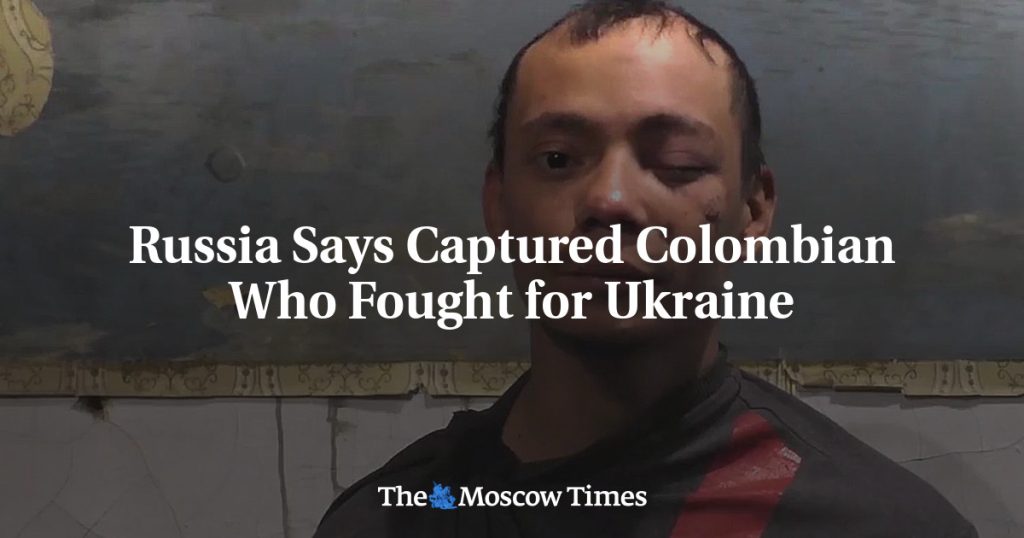Russia’s Defense Ministry announced that they had captured a Colombian man, Angel Cardenas Montilla, who had allegedly fought as a mercenary on the side of Ukraine. Cardenas Montilla had reportedly come to Ukraine in response to an advertisement on TikTok calling for mercenaries to fight against Russia. In an interrogation video released by the Russian military, Cardenas Montilla, a former police officer and father of four, claimed to have received minimal combat training in Ukraine and stated that he was mistreated and lied to by Ukrainian authorities. He urged his fellow Colombians to avoid traveling to Ukraine and joining its military.
In the video, Cardenas Montilla appeared with bruises on his face and a swollen eyelid, stating that he was the only survivor out of a group of nine Colombians before being captured. Despite his apparent injuries, Cardenas Montilla praised the Russian military and his treatment while in captivity. It is unclear whether his statements were made under duress. The Kremlin has frequently accused Kyiv of recruiting foreign mercenaries to fight against Russian forces, while facing accusations of luring foreigners from poor nations to fight against Ukraine.
Colombia has condemned Russia’s 2022 invasion of Ukraine, but President Gustavo Petro has opposed sending weapons to support Ukraine and has advocated for a negotiated resolution to the conflict. The capture of Cardenas Montilla highlights the complexities and involvement of foreign nationals in the ongoing conflict in Ukraine. This event further underscores the international ramifications of the Russia-Ukraine conflict and the recruitment of foreign mercenaries by both sides. The actions and statements made by Cardenas Montilla shed light on the experiences of individuals drawn into the war as mercenaries, and the differing stances taken by various countries regarding their involvement in the conflict.
As tensions between Russia and Ukraine continue to escalate, the capture and statements of Angel Cardenas Montilla serve as a reminder of the human cost of conflict and the involvement of individuals from around the world in the fighting. The exploitation of foreign mercenaries in the conflict adds another layer of complexity to an already volatile situation. President Petro’s reluctance to provide military support to Ukraine underscores the challenges faced by countries in navigating their relationships with the conflicting parties while advocating for peaceful resolutions. The capture of Cardenas Montilla by Russian forces highlights the risks faced by foreign nationals who become entangled in conflicts far from their homelands.
The incident involving Angel Cardenas Montilla draws attention to the role of social media in recruitment efforts for foreign fighters in conflicts like the one between Russia and Ukraine. The use of platforms like TikTok to attract mercenaries from abroad underscores the evolving nature of warfare and the ways in which technology is being utilized in recruitment strategies. The capture of Cardenas Montilla by Russian forces also raises questions about the treatment of foreign fighters and the narratives that may be presented in interrogation videos. As the conflict in Ukraine continues, the involvement of foreign nationals like Cardenas Montilla highlights the global impact and complexities of the situation on the ground.
In conclusion, the capture of Angel Cardenas Montilla, a Colombian man alleged to have fought as a mercenary in Ukraine, sheds light on the international dimensions of the conflict between Russia and Ukraine. His statements about his experiences and treatment in captivity raise important questions about the role of foreign mercenaries in modern warfare and the recruitment strategies employed by both sides. As the conflict continues to unfold, the involvement of individuals like Cardenas Montilla underscores the need for a comprehensive and diplomatic resolution to the crisis, as well as the challenges faced by countries in navigating their relationships with conflicting parties. The incident serves as a stark reminder of the human toll of war and the complexities of conflicts that extend far beyond national borders.















